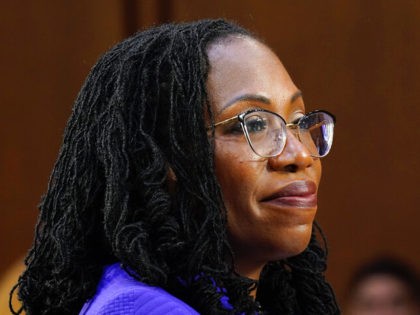Nathan Lewin (JNS) Despite much vocal opposition from Republican senators, Ketanji Brown Jackson is on her way to joining the Supreme Court. There is little doubt that she will ally with Justices Sonia Sotomayor and Elena Kagan in the court’s liberal wing. But is she a threat to America’s Jews and to Israel? Critics have pointed to her membership in Harvard’s Black Students Association as an undergraduate, and they tar her with anti-Semitic sympathy because the organization invited a notorious black anti-Semite to address its membership.
There is no evidence that she participated in the decision to issue that invitation or that her views then or now mirror the speaker’s. Not much else in the public record suggests what can be expected from her as a justice on legal issues that could impact America’s Jews.
I confess to some personal bias. In 1999, Jackson was an associate in the 35-member law firm Miller Cassidy Larroca & Lewin, of which I am the sole surviving name partner. She left the firm to start a clerkship with Justice Stephen Breyer in August of that year. I have no personal recollection of working with her on the litigations that I was handling at the time. But in May of that year, I was heading the effort to bring to the Supreme Court for a second appearance the case for state funding of the school for learning-disabled children in Kiryas Joel—the all-Satmar Chassidic community in New York. The court had ruled in 1994 that the law creating a governmentally funded school district in the religious community was unconstitutional, but the New York legislature repeatedly amended the law to authorize broader arguably constitutional funding for municipalities seeking to create their own school districts. These changes in the law kept the Kiryas Joel school in operation while the constitutionality of the new statutes was again making its way through the courts.
On May 11, 1999, the New York Court of Appeals divided 4-3 on the latest amended law. The majority found the amendment unconstitutional, but there was a strong dissent. Representing Kiryas Joel’s Board of Education, I rushed to take the New York decision to the United States Supreme Court so that the school would not be immediately shuttered. I don’t recall which young lawyer in our firm I assigned to hurriedly draft a petition for Supreme Court review, but the time-keeping diary I still have for that period shows 2.2 hours I spent on “Kiryas Joel” on May 19, 1999–“Revised KJ draft.” The initials “KJ” indicate that the draft I reviewed was written by Ketanji Jackson because I customarily noted the initials of the firm’s lawyer who had assisted me. Since we knew by then that she had been selected for a Supreme Court clerkship, it was natural to choose her to draft a potential petition. (On June 2, 1999, we filed a petition and a request with the Supreme Court to stay the New York decision and won a surprising order on June 21 that retained state funding and kept the school going. The law was again amended that summer, and our opponents then gave up their challenge.)
Two rulings issued by Jackson while she was a district judge have garnered little notoriety, but they are, for America’s Jews, grounds for optimism.
As a counter to the notorious Israel-baiting J Street, a pro-Zionist group called Z Street was formed in Pennsylvania in 2009. Its application for tax-exempt status under Section 501(c)(3) of the Tax Code was delayed by the IRS under a policy that prescribed more exacting review for organizations “connected with Israel.” Z Street filed a lawsuit in a Pennsylvania federal court claiming that this “special policy” was unconstitutional. On the IRS’s motion, the case was transferred to the District of Columbia, and it was randomly assigned to Judge Jackson.
The Obama Justice Department strenuously contested Z Street’s legal claim, and it argued that the lawsuit should be dismissed. In May 2014, Judge Jackson ruled in a detailed opinion that Z Street’s lawsuit should continue. The Court of Appeals approved her decision in June 2015. It then took until February 2018, during the Trump administration, for the case to be settled and for the IRS to apologize to Z Street.
Her sympathy for claims of religious liberty may have been disclosed in a case that came to District Judge Jackson in 2017. A lawsuit was initiated by a U.S. Postal Service employee named Howard Tyson, who claimed that his supervisor allowed other employees to play music while they worked but denied a promotion to Tyson because he played Christian gospel music over the supervisor’s objection to “religious music.” Judge Jackson refused to dismiss the case, saying that this was “a plausible claim for religious discrimination.”
A different district judge who took over the case when Jackson was promoted to the Court of Appeals ruled against Tyson in November 2021. The case is now on appeal. Jackson’s initial ruling at the outset of the case is no longer an issue, but it demonstrated judicial receptivity for a somewhat tenuous claim of religious freedom.
These are thin reeds on which to make any prediction of what Justice Jackson will do. But it is all we have.
Nathan Lewin is a criminal defense attorney with a Supreme Court practice who has taught at Georgetown, Harvard, University of Chicago, George Washington and Columbia law schools.




